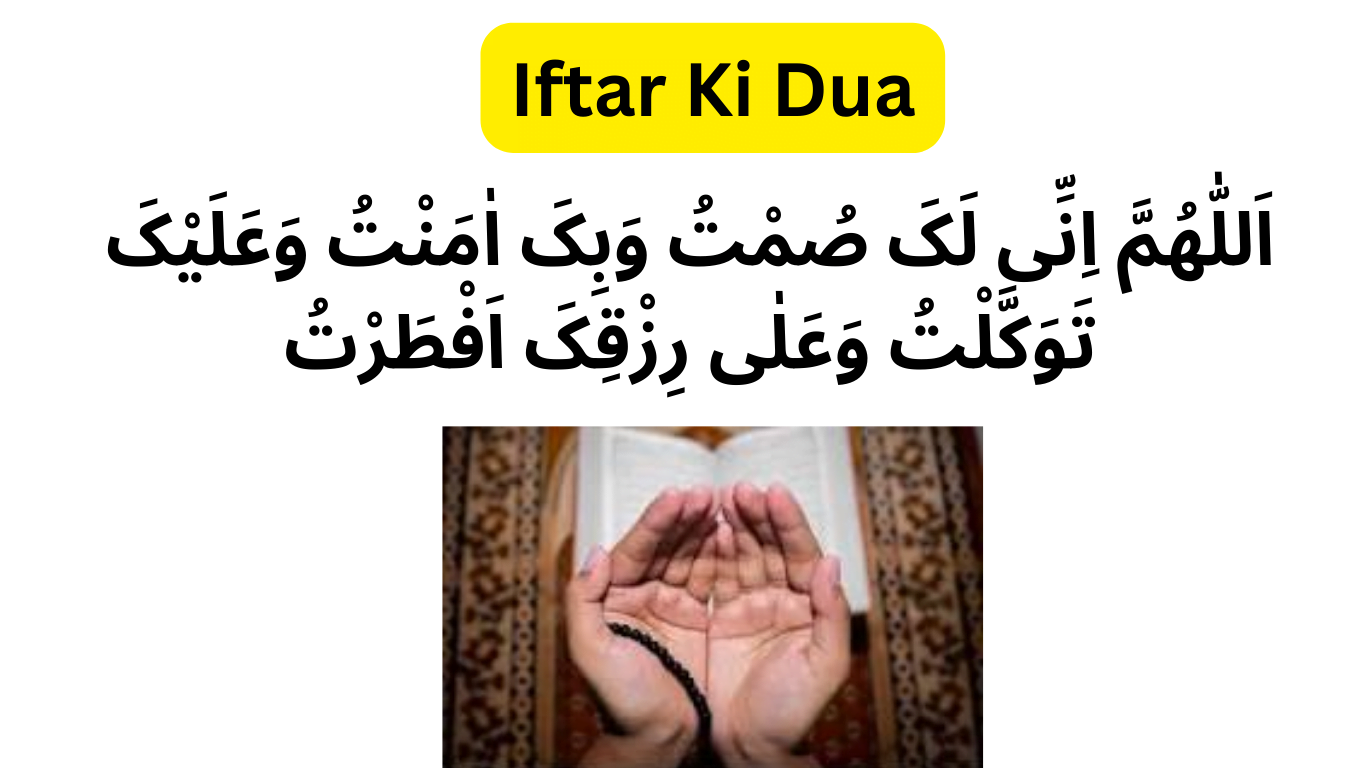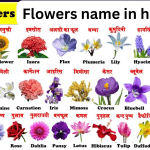As the Holy month of Ramadan unfolds, Muslims around the world engage in a myriad of spiritual practices, one of which is the profound tradition of iftar ki dua. This sacred act of supplication holds a special place in the hearts of the faithful, serving as a moment of reflection, gratitude, and connection with the divine. As daylight fades and shadows lengthen, a quiet descends upon Muslim communities globally. This marks the prelude to a cherished ritual during Ramadan – the breaking of the fast, known as Iftar. More than a moment of physical nourishment, Iftar signifies a spiritual shift, where a simple yet profound supplication, Iftar ki dua, takes center stage. This brief prayer encapsulates the essence of gratitude, humility, and devotion integral to Ramadan.
Roza Iftar Ki Dua in Arabic:

اَللّٰهُمَّ اِنِّی لَکَ صُمْتُ وَبِکَ اٰمَنْتُ وَعَلَيْکَ تَوَکَّلْتُ وَعَلٰی رِزْقِکَ اَفْطَرْتُ
Transliteration:
Allahumma inni laka sumtu wa bika aamantu [wa ‘alayka tawakkaltu]wa ‘ala rizq-ika aftartu
Iftar ki Dua in English

O Allah! I fasted for you and I believe in you and I put my trust in You and I break my fast with your sustenance.
Iftar ki dua in Hindi:

ओ अल्लाह! मैंने आपके लिए उपवास किया है और मैं आप पर विश्वास करता हूं और मैंने आप पर भरोसा किया है और मैं आपके भोजन से अपना उपवास तोड़ता हूं।
Iftar Ki Dua in Bangla:
হে আল্লাহ! আমি আপনার জন্য রোজা রেখেছি এবং আমি আপনার উপর ঈমান এনেছি এবং আমি আপনার উপর ভরসা করেছি এবং আমি আপনার রিজিক দ্বারা আমার রোজা ভঙ্গ করি।
Iftar Ki Dua in Urdu:
اے اللہ! میں نے تیرے لیے روزہ رکھا اور تجھ پر ایمان لایا اور تجھ پر توکل کیا اور تیرے ہی رزق سے افطار کیا۔
Roza Kholne Ki Dua
O Allah! I Fasted For You And I Believe In You And I Put My Trust In You And I Break My Fast With Your Sustenance.
Roza Kholne Ki Dua in Hindi
हे भगवान, मैंने तुम्हारे लिए उपवास किया है, और तुम पर मैंने विश्वास किया है [और तुम पर मैंने अपना भरोसा रखा है] और तुम्हारे प्रावधान में मैंने अपना उपवास तोड़ दिया है।
Ramadan Iftar Dua:
The advantages and divine favors of the Iftar Dua, also known as the “Roza Kholne ki dua” and “iftari ki dua,” are countless. The benefits of reciting this supplication during the breaking of the fast are too numerous to enumerate. If individuals truly grasp its significance and meaning, they would desire to experience the blessings of Ramadan throughout the entire year. Allah, the Almighty, bestows abundant blessings, rewards, and advantages upon those devout Muslims who observe fasting with unwavering faith and high expectations. It is crucial for us to express profound gratitude to Allah for these blessings, as well as for the unique and essential month of Ramadan, which holds significant importance for every Muslim. Included here is the Iftar Dua to assist you in familiarizing yourself with it.
Significance of Iftar Ki Dua
Spiritual Importance
Iftar ki dua, or the prayer recited when breaking the fast, goes beyond a mere religious ritual. It symbolizes a moment of gratitude, humility, and acknowledgment of the sustenance provided during the day of fasting.
CHECK THIS:
https://hindijankaree.com/sahri-ki-dua/
https://hindijankaree.com/taraweeh-ki-dua/
Traditions and Cultural Significance
Across diverse cultures, iftar ki dua is not only a religious practice but also a cultural tradition. The way it is performed varies, reflecting the rich tapestry of global Islamic heritage.
The Unfolding Words:
Traditionally recited in Arabic, the Iftar dua begins with the familiar invocation:
“In the name of Allah, the Most Gracious, the Most Merciful.”
This sets the stage for the heart of the dua:
“O Allah, You are my Lord, and I am Your servant. You gave me drink when I was thirsty, clothed me when I was naked, fed me when I was hungry, provided security when I was afraid, and guided me when I was lost.”
These words weave a tapestry of emotions and experiences, acknowledging Allah’s ultimate provision – from quenching thirst to shielding from fear. It underscores our dependence on His boundless compassion.
Beyond the Words:
The significance of Iftar ki dua goes beyond recitation. It’s a moment of reflection, acknowledging challenges overcome and blessings received. It reaffirms faith, a testament to the trust placed in Allah’s infinite wisdom.
Moreover, Iftar ki dua fosters a sense of community. As families and friends gather for Iftar, the shared recitation unites them in gratitude and devotion. It becomes a powerful reminder of the universal human experience, where differences fade in the face of shared faith and vulnerability.
The Enduring Legacy:
Passed down through generations, the tradition of Iftar ki dua serves as a constant reminder of Ramadan’s purpose – spiritual growth, self-discipline, and empathy for the less fortunate. Breaking the fast with this prayer, we carry its essence into our lives, striving to be grateful, compassionate, and mindful of the divine presence.
So, when the call to Iftar resonates, remember it’s not just about food but an invitation to a deeper connection with Allah. Embrace the spirit of Iftar ki dua, for in that humble supplication, we find true nourishment for our souls.
Additional Notes:
This article provides a general overview of Iftar ki dua. Translations and pronunciations may vary regionally.
Explore further resources or consult with local religious leaders for a deeper understanding.
May this detailed article enhance your understanding of the significance and meaning of Iftar ki dua.
Historical Roots
Origin and Evolution
The roots of iftar ki dua can be traced back through centuries, evolving with time and cultural influences. Understanding its historical context provides deeper insight into its significance and variations.
Cultural Variations Across Regions
Different regions have infused their unique cultural elements into the practice of iftar ki dua. From the Middle East to Southeast Asia, each community has added its distinct flavor to this sacred tradition.
The Essence of Gratitude
Connection Between Iftar Ki Dua and Gratitude
At its core, iftar ki dua is an expression of gratitude. It serves as a reminder to appreciate the blessings of sustenance and the opportunity to connect with the divine during the holy month of Ramadan.
How It Fosters Mindfulness During Ramadan
The act of reciting iftar ki dua fosters mindfulness, encouraging individuals to be present in the moment and truly appreciate the nourishment provided after a day of fasting.
Iftar Ki Dua Traditions Around the World
Diverse Practices in Different Cultures
From elaborate community gatherings to intimate family affairs, iftar ki dua takes on various forms worldwide. Exploring these diverse practices provides a glimpse into the rich cultural tapestry of Islam.
Common Themes and Variations
While the practices may differ, common themes run through iftar ki dua traditions globally. The essence of gratitude, humility, and spiritual connection unites Muslims in their observance of this sacred ritual.
Spiritual Reflections
Impact on the Individual’s Spiritual Journey
For many, iftar ki dua is a deeply personal and spiritual experience. It becomes a time for self-reflection, introspection, and a reconnection with one’s faith.
Personal Testimonials and Experiences
Numerous individuals share their personal testimonials, recounting the transformative impact of iftar ki dua on their spiritual journey during Ramadan.
Iftar Ki Dua: A Family Affair
Role in Family Bonding
Beyond its individual significance, iftar ki dua plays a crucial role in family bonding. Families come together to break their fast, share the moment of prayer, and strengthen their familial ties.
Passing Down Traditions
The tradition of iftar ki dua is often passed down through generations, creating a cultural continuity that connects the young and old in a shared spiritual experience.
The Linguistic Beauty
Exploring Linguistic Aspects
The linguistic beauty of iftar ki dua adds another layer to its significance. The poetry and prose embedded in these supplications create a profound spiritual experience for those reciting and listening.
Poetry and Prose in Different Cultural Expressions
Diverse linguistic expressions enrich iftar ki dua, with poetic renditions and prose reflecting the cultural nuances of the communities that practice them.
Contemporary Relevance
Adapting to Modern Lifestyles
In a rapidly changing world, iftar ki dua adapts to modern lifestyles. The digital age has brought about new ways to engage in this sacred tradition, with social media and virtual communities playing a significant role.
Social Media and Virtual Communities
Online platforms provide a space for individuals to share their iftar ki dua experiences, fostering a sense of global unity and community spirit during Ramadan.
Tips for a Meaningful Iftar Ki Dua
Creating a Serene Environment
To enhance the spiritual experience of iftar ki dua, creating a serene and dedicated environment is crucial. Eliminating distractions allows individuals to fully immerse themselves in this sacred act.
Personalization for a Deeper Connection
Tailoring the dua to one’s personal experiences and feelings deepens the connection with the divine. Encouraging individuals to infuse their personal touch into the supplication fosters a more meaningful experience.
Common Misconceptions
Clarifying Misconceptions Surrounding Iftar Ki Dua
In some instances, misconceptions about iftar ki dua may arise. It’s essential to address and clarify these misconceptions to promote a better understanding of this sacred practice.
Promoting Understanding and Tolerance
By dispelling myths and promoting understanding, communities can foster tolerance and respect for the diverse ways in which iftar ki dua is practiced.
Celebrity Perspectives
Instances of Public Figures Expressing Importance
Public figures, including celebrities, often share their perspectives on the significance of iftar ki dua. These instances contribute to the mainstream acknowledgment of this spiritual tradition.
Influence on Mainstream Culture
As public figures embrace iftar ki dua, its influence extends to mainstream culture, bringing awareness to a wider audience.
Iftar Ki Dua in Literature and Art
Depictions in Literature, Paintings, and Other Art Forms
The beauty of iftar ki dua is not limited to its recitation. It finds expression in literature, paintings, and various art forms, enriching cultural contributions to the broader narrative.
Cultural Contributions to the Broader Narrative
Artistic representations of iftar ki dua contribute to the cultural narrative, shaping perceptions and fostering a deeper appreciation for this sacred practice.
Future Trends
Evolving Trends in Iftar Ki Dua Practices
As the world evolves, so do the practices surrounding iftar ki dua. Exploring emerging trends provides insights into the evolving landscape of this sacred tradition.
Emerging Innovations in Cultural Expressions
Innovations in cultural expressions related to iftar ki dua showcase the adaptability of this tradition to contemporary lifestyles, ensuring its continued relevance.
Conclusion
In conclusion, iftar ki dua goes beyond a religious practice; it is a spiritual journey that unites individuals across cultures and continents. Its historical roots, diverse expressions, and contemporary adaptations showcase the resilience and beauty of this sacred tradition. As we continue to explore the multifaceted aspects of iftar ki dua, let us embrace the unity it brings during the holy month of Ramadan.
FAQS
Q1: What is Iftar Ki Dua?
Iftar Ki Dua refers to the supplication or prayer recited by Muslims before breaking their fast during the holy month of Ramadan. It is a tradition to invoke blessings and express gratitude to Allah for the sustenance provided after a day of fasting.
Q2: When should I recite the Iftar Ki Dua?
The Iftar Ki Dua is recited at the moment of breaking one’s fast, just before eating the evening meal known as iftar. This supplication is traditionally recited right after the sunset, as it marks the end of the daily fasting period during Ramadan.
Q3: What is the significance of reciting Iftar Ki Dua?
Reciting the Iftar Ki Dua is a spiritual practice in Islam that carries deep significance. It is a moment of reflection, gratitude, and humility, where Muslims express thanks to Allah for providing sustenance and acknowledge the importance of self-discipline and sacrifice during the month of Ramadan.
Q4: Is there a specific Dua for breaking the fast during Iftar?
Yes, there is a specific Dua for breaking the fast during Iftar, known as “Dua for Iftar” or “Iftar Ki Dua.” The common Arabic phrase for this supplication is “Allahumma inni laka sumtu wa bika aamantu wa ‘ala rizq-ika aftartu,” which translates to “O Allah, I fasted for You and I believe in You and I break my fast with Your sustenance.”
Q5: Can I recite the Iftar Ki Dua in my native language?
While the traditional Iftar Ki Dua is recited in Arabic, it is acceptable to recite it in one’s native language if the individual does not know Arabic. The essence of the supplication, expressing gratitude and seeking blessings, is more important than the language used. However, learning the Arabic version is encouraged for a deeper connection with Islamic traditions.










